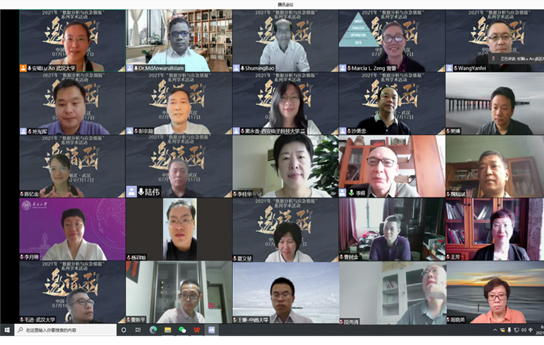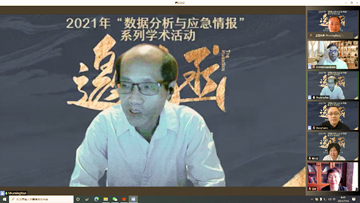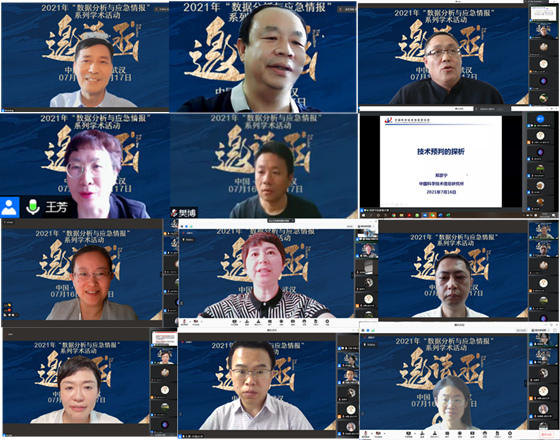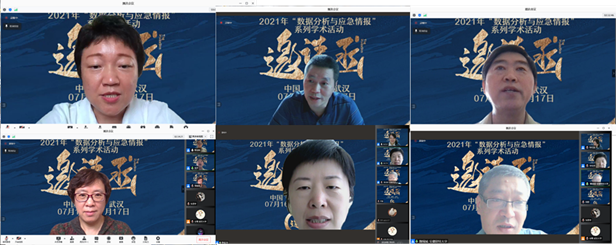From July 16 to 17, 2021, the 2021 Data Analysis and Emergency Intelligence was jointly hosted by the Center for Studies of Information Resources, Wuhan University, the School of Information Management, Wuhan University, Association for Information Science and Technology (ASIS&T) Special Interest Group on Knowledge Management (SIG-KM), International Society for Knowledge Organization (ISKO) China Chapter, and was undertaken by the No. 17JZD034 project team of the Major Research Project of Philosophy and Social Sciences of the Ministry of Education. A series of academic activities of 2021 Data Analysis and Emergency Intelligence were successfully held online, and more than 20 well-known experts and scholars brought a wonderful academic feast. The event attracted extensive attention from relevant communities. More than 5100 people participated in and watched the event via the platform of Tencent Meeting, Xueshuzhi App, Xueshuzhi video account.

The first part of the activity was international frontier academic reports. Lei Zeng, Professor and member of International Society for Knowledge Organization (ISKO), and Md. Anwarul Islam, Chairman of Association for Information Science and Technology (ASIS&T) Special Interest Group on Knowledge Management (SIG-KM), delivered speeches. Lei Zeng expressed that in emergency situations, semantic conflict and information overload exacerbate confusion, and the key to alleviating this confusion is information organization. How to arrange and organize the information orderly is the basic requirement for subsequent data analysis and management decision-making. Md. Anwarul Islam pointed out that knowledge management is closely related to data analysis, and the technologies and methods related to knowledge management can provide technical support for the research of crisis informatics. This part was presided over by Lu An, Professor at the School of Information Management, Wuhan University.

Shuming Bao, Professor and Director of China Data Center, was invited to make a keynote report entitled with COVID-19's Quick Response: Data, Methods, Technologies, Research Applications and Academic Publishing.Shuming Bao believed that the rapid response to COVID-19's challenge comes from three aspects: data source, data platform and data team selection. In order to better meet the data needs of COVID-19 related research and research resource sharing needs, Shuming Bao and his team launched the project of COVID-19’s Rapid Response, which collected, integrated, reported and released the COVID-19 data, and provided spatio-temporal data for the global COVID-19 research.

The second part of the activity was the academic seminar on Data Analysis and Emergency Intelligence. Wei Lu, Professor and Dean of the School of Information Management, Wuhan University, and Gang Li, Professor and Director of the Center for Studies of Information Resources, Wuhan University, delivered a speech. Wei Lu emphasized the importance of emergency management and the important role of Informatics in the field of emergency management, and pointed out how to use informatics methods to solve problems in emergency management, which has attracted the attention of people in the industry. In the context of big data and artificial intelligence, experts and scholars need to make contributions to the major needs of the country and academic frontier. Gang Li expressed that, at present, the attention of various fields to data governance and crisis security is rising rapidly. Contemporary science, technology and civilization have developed to a new stage. On the one hand, the more developed civilization is also more vulnerable. On the other hand, new technological means make it possible for us to resist the crisis. All disciplines should work together to combine research in the fields of data analysis, emergency intelligence, security management and public management, so as to contribute to human development and social stability. This part was presided over by the following people respectively:
Lu An, Professor at the School of Information Management, Wuhan University,
Yongxiang Dou, Professor at the School of Economics & Management, Xidian University,
Guanghui Ye, Associate Professor and Department Director of the School of Information Management, Central China Normal University,
Jin Mao, Associate Professor at the School of Information Management, Wuhan University,
Guancan Yang, Associate Professor at the School of Information Resource Management, Renmin University of China,
Yijin Chen, Associate Professor at the School of Economics & Management, South China Normal University.

In the keynote report session, Zongchao Peng, Professor and CPC Secretary of the School of Public Policy & Management, Tsinghua University, put forward his own thoughts on the construction of the national security risk assessment index system. In the report, he outlined the development and evolution of the concept and system of national security, and introduced the construction and research of national security risk assessment index system at home and abroad. Based on China's overall national security concept and focusing on the construction of national security risk assessment index system, Zongchao Peng expounded the relevant steps of establishing national security risk assessment index system. He stressed that the establishment of national security risk assessment indicators is of great significance for government departments to carry out national security event risk monitoring, early warning and advanced governance.
Yongzhong Sha, Professor and Vice President of Lanzhou University, reported on relevant research on collaborative governance of public security data. He pointed out that at present, data has become a strategic resource and production factor. Public security governance emphasizes the construction of organizational coordination mechanism. The key elements of data governance are highly consistent with the elements of organizational coordination. Based on the activity theory, Yongzhong Sha constructed activity model of public security data collaborative governance, refined the key elements of public security data collaborative governance, and summarized four types of public security data collaborative governance, including structural collaboration, procedural collaboration, targeted collaboration and situational collaboration.
Yanfei Wang, Professor at the Department of Information Management, Peking University, made a special report on Data Basis of Information Emergency Response. He expounded the core mission of information work, the values of information emergency response, the basic tasks involved in information emergency response, the perception and traceability of information, and the evaluation standards of information emergency response business, discussed the systematic view of data analysis ability and the scientific view of information research management, and explored the characteristic core methods of information research from the perspective of information science.
Fang Wang, Professor and Director of the Center for Network Society Governance, Nankai University, made a special report on Personal Privacy Protection in Government Information Disclosure. She outlined the situational integrity theory of privacy, analyzed 415 epidemiological investigation reports and corresponding Weibo comments in 27 cities, constructed the situational factor model of government disclosure of personal information and the classification framework of personal information disclosure in epidemic prevention and control, and obtained policy enlightenment, including situational consideration, minimum necessity, regulation formulation, standard formulation, desensitization and privacy awareness cultivation.
Bo Fan, Professor and Associate Dean of the School of International and Public Affairs, Shanghai Jiao Tong University, made a special report on The Layout of Big Data Driven Emergency Resources. He explained the implementation process of big data-driven emergency resource layout from four aspects: emergency risk grid division method, emergency resource planning and layout, emergency resource demand calculation and emergency resource reserve and supply business process. He stressed the necessity to establish an emergency resource database across departments, between government and enterprises and between government and people, realize one map full dispatching, and build an emergency resource supply system under the pattern of government governance.
Yanning Zheng, Research Librarian and Director of Science and Technology Report Service and Industrial Information Research Center, Institute of Scientific and Technical Information of China, made a specially invited report on An Analysis on Technology Prediction. He described the S-curve of technology development, put forward the methodology of technology prediction, and divided technology prediction into four dimensions: technology, policy, organization and people, and market. Yanning Zheng also shared the Institute of Scientific and Technical Information of China’s analysis, prediction and verification of DNA sequencing technology, highlighting the important role of information analysis in decision-making.
Lu An, Professor at the School of Information Management, Wuhan University, made a special report Emergency Information Analysis on Event Early Warning, Response and Prediction, which discussed the ideas and paths of implementing intelligent emergency based on information analysis. Among them, emergency early warning includes evaluating the severity of the event according to the performance of the event in the network, early warning and identifying network rumors; Event response includes the measurement and portrait of stakeholders' topic influence and emotional appeal, and the identification methods of opinion leaders and opinion twisters in the comments; The event prediction includes the prediction of public security weibo information communication from the perspective of heterogeneous information network embedding and the prediction of Internet users' attention transfer in the context of multi-topic competition.
Xiwei Wang, Professor and Director of the Big Data Management Research Center, Jilin University, made a special report Data Driven and Emergency Management -- New Opportunities, New Challenges and New Responses. She first introduced her team's relevant research on rumor governance and personal information protection, shared the teaching case of Building a Smart Brain for Epidemic Prevention via Blockchain - The Road to Innovation of Epidemic Emergency Information Management Service in Jinan. Then she expounded the response strategies of emergency management from two aspects of national and academic research, and finally from emergency analysis platform, strategic management, operation management and information system, she put forward the research problems of the future development of data-driven emergency management.
Peng Wu, Professor at the School of Cyber Science and Engineering and Associate Dean of the School of Economics and Management, Nanjing University of Science & Technology, made a special report on The Modeling Research of Negative Emotions of Internet Users Based on SOAR Model. He pointed out that it is easy to breed emotional state transfer in the process of public opinion events, and negative emotional polarization affects social and public security. In this study, Peng Wu constructed the SOAR Agent emotional state transfer model, explored the mechanism of Internet users' emotional state transfer, and found the impact of different types of events and different types of government behavior in different types of events on Internet users' emotional state transfer through simulation experiments.
Li Tian, Associate Professor at the New Media Research Institute, Peking University, gave a special report Network Structure Analysis of Global Media Information Flow. Based on the center edge theory and the global information flow network, she studied the characteristics of the world's major media information flow networks and the factors affecting the network structure. The study found that the spread of global media information circulation network presents a multi stand situation. The central edge structure of the global main media's information flow network is related to the level of economic development of various countries. The discourse power of the major media in the world is huge. COVID-19 has intensified the flow of information between different political ideology countries.
Bing Wang, Professor at the discipline of Safety Science and Engineering, Central South University, made a special report on A Basic Research of Perspectives and Directions of Modern Safety Information (Science). He discussed from three aspects: general safety concept, general safety information concept and the safety management oriented perspective, introduced the differences between safety and security from six aspects: the causes of safety events, threats (dangers), the scope of impact and loss, industries and fields involved, uncertainty and safety strategies, and integrated safety and security from a system perspective to build a system safety framework, This report expounded the basic problems of general safety science.
Ming Ren, Associate Professor at the School of Information Resource Management, Renmin University of China, made a special report on Big Data Integration of Emergency Management. Aiming at the problem of the relationship between tasks and data, he carried out relevant research and found that tasks and data show a multi-to-multi relationship. In addition, taking urban waterlogging as an example, this study constructed a knowledge map based on real data and application scenarios, and showed the map of No. 1 Flood event in the Yangtze River in July 2016.

The following experts commented on some of the specially invited reports, and participated in the discussion:
Yuelin Li, Associate Dean of the Business School, Nankai University,
Shujin Cao, Professor at the School of Information Management, Sun Yat-sen University,
Ping Ke, Professor and Director of Degree Center of Library and Information Specialty, Nankai University,
Xiaoying Zhou, Professor at the School of Information Resource Management, Renmin University of China,
Ruibin Wei, Associate Dean of the School of Management Science and Engineering, Anhui University of Finance and Economics,
Guihua Li, Professor at the School of Public Administration, Sichuan University.

Yikun Xia, Professor and Deputy Director of the Center for Studies of Information Resources, Wuhan University, and Professor Lu An summarized the contents of the two-day conference respectively. Yikun Xia affirmed the profound academic insight and inspiration shown by the conference, reflecting the academic feelings and scholar responsibility of multidisciplinary scholars in face of an unprecedented major crisis related to the country and mankind. Lu An thanked the experts and scholars who participated in the meeting and looked forward to more academic exchange activities in the future.